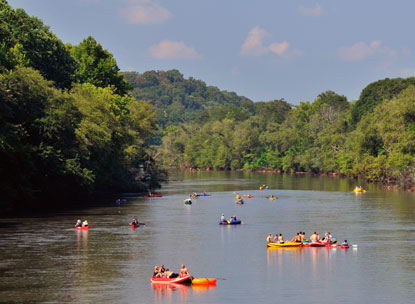This city on the border of Alabama, where the last battle of the Civil War was fought -- after the surrender at Appomattox -- is a wealthy city and always has been.
 |
| The Chattahoochie River |
 |
| Typical Chattahoochie River activity these days. |
The Slave Coast event today was held one campus -- there are at least two campuses, within walking distance of each other. Working here has to be great, and being a student as well. Due to the wealthy people mentioned above, and hte very many scholarships and programs they fund, there is a large diversity of students and programs. They are very strong in both the technologies and the arts, both of which are very well-funded.
We were slotted into the main humanities Schwob Library. The presentation was was well attended, by people from the community, faculty and their students, heads of various areas of the library and the history dept. and some friends drove over from Atlanta to hear us. The event concluded with interesting and smart questions, and a great deal of commentary about the capitalist system, which demanded the shredding historically of the black family, preventing any aggregation generationally of resources, wealth and influence, in contrast with the owners of the black families. The white family networks continued to inter-marry with each other in the southern and northern branches, getting richer, better connected and more powerful in every generation. This means that whenever an individual family member had difficulties there was a large safety network to hold that person up (which allowed for southern families in these networks to re-establish their positions quickly after the War of Southern Aggression concluded). Black families did not have this.
We would have participated ourselves more in the discussion if we'd gotten any sleep over the last three nights.
After being taken to lunch we were given a guided tour of the city's history past and present, and the university's history (founded in 1958), past and present.
Less positively, the Georgia governor is about to sign into law the right to open carry on Georgia campuses. Not in fraternities, gyms, housing or anywhere else except -- the libraries and research facilities and classrooms.
The state as a whole didn't want this, but the NRA swooped in with freight loads of money and sponsored 'their' guys in the legislature and got it. 19 states now, where the NRA has done this.
Tonight's going to be an early one thank goodness, as we excused ourselves early from dinner. We've eaten all too well and too much over the last three days -- southern food and southern company is irresistible, but we had to leave.
We were planning to take a leisurely, winding route back home, but it turns out we have to get back home as soon as possible since Ned's going to Cuba again for 8 days, early on the 3rd, and things have come up over night re TASC, including a request to be interviewed for a new ESPN program featuring -- get this! us!? -- sports -- race and culture, debuting May 17th. The hostess of this new program wants to interview us about Slave Coast issues in connection with the reboot of Alex Haley's Roots, which premieres on the History Channel May 30. She wants to do this interview asap.
We're spending tomorrow night in Athens, as tomorrow we're being hosted for lunch by this fellow: scroll down to "Charles Peters" . . . and having dinner with an anthropologist at the university who has been doing a lot of work with the Georgia ring shout groups.
This means we can't be get home until later, on Friday night. Laundry and other preps for Cuba where Himself's running a conference on Cuban music and it's future and influence in the world at large must be raced through between Sat. - Mon.
Also, I have to watch the whole reboot of Roots by Monday.

No comments:
Post a Comment